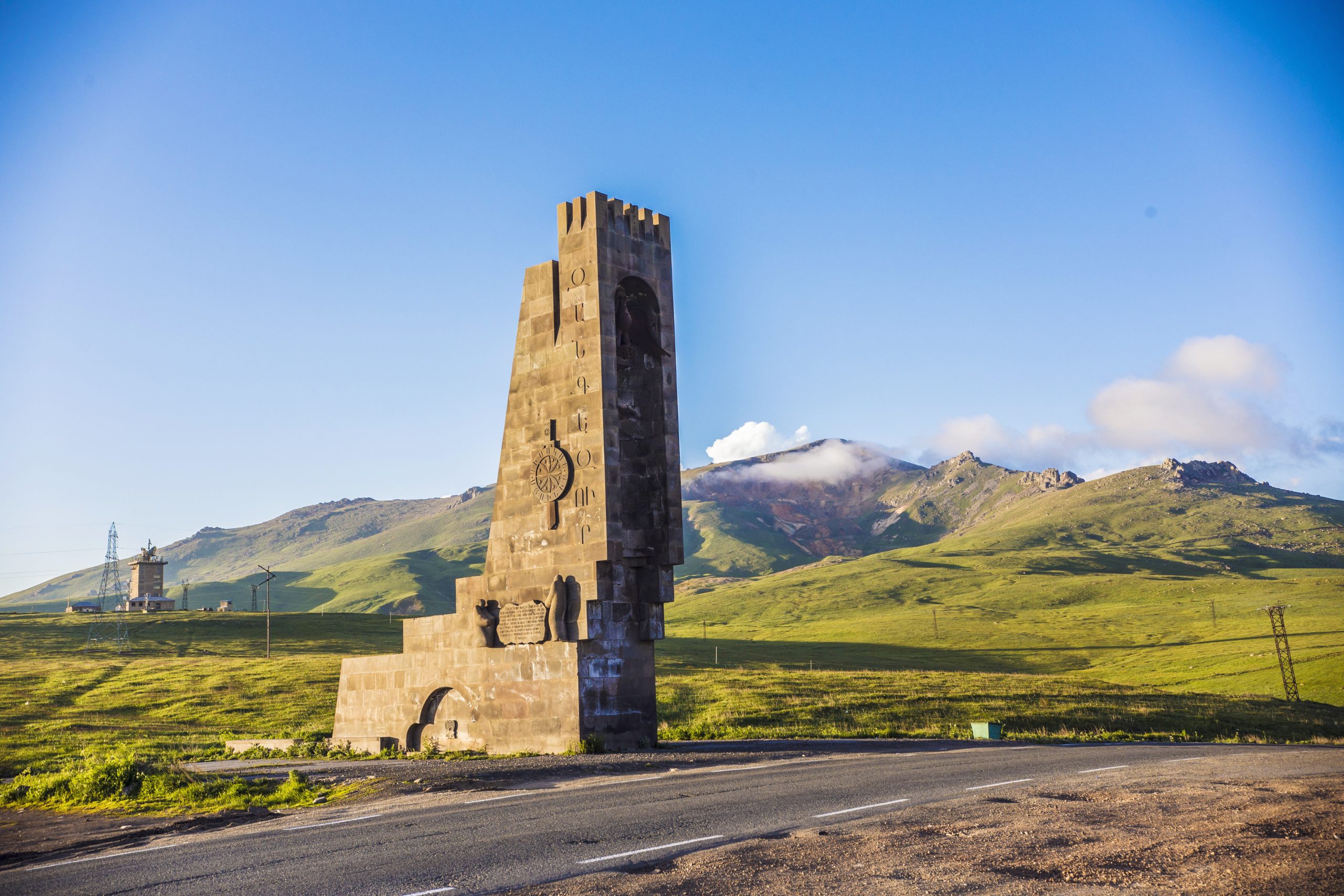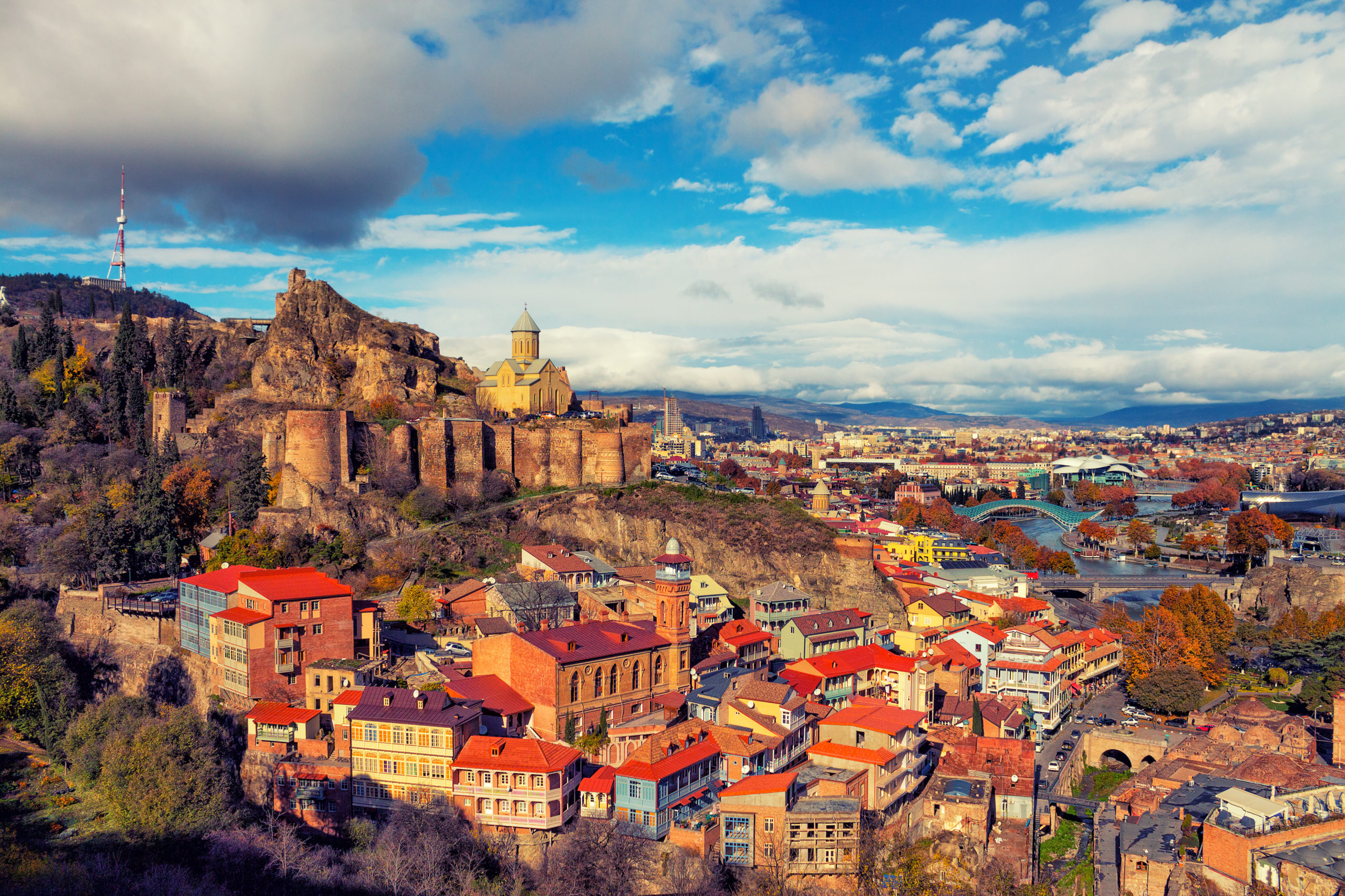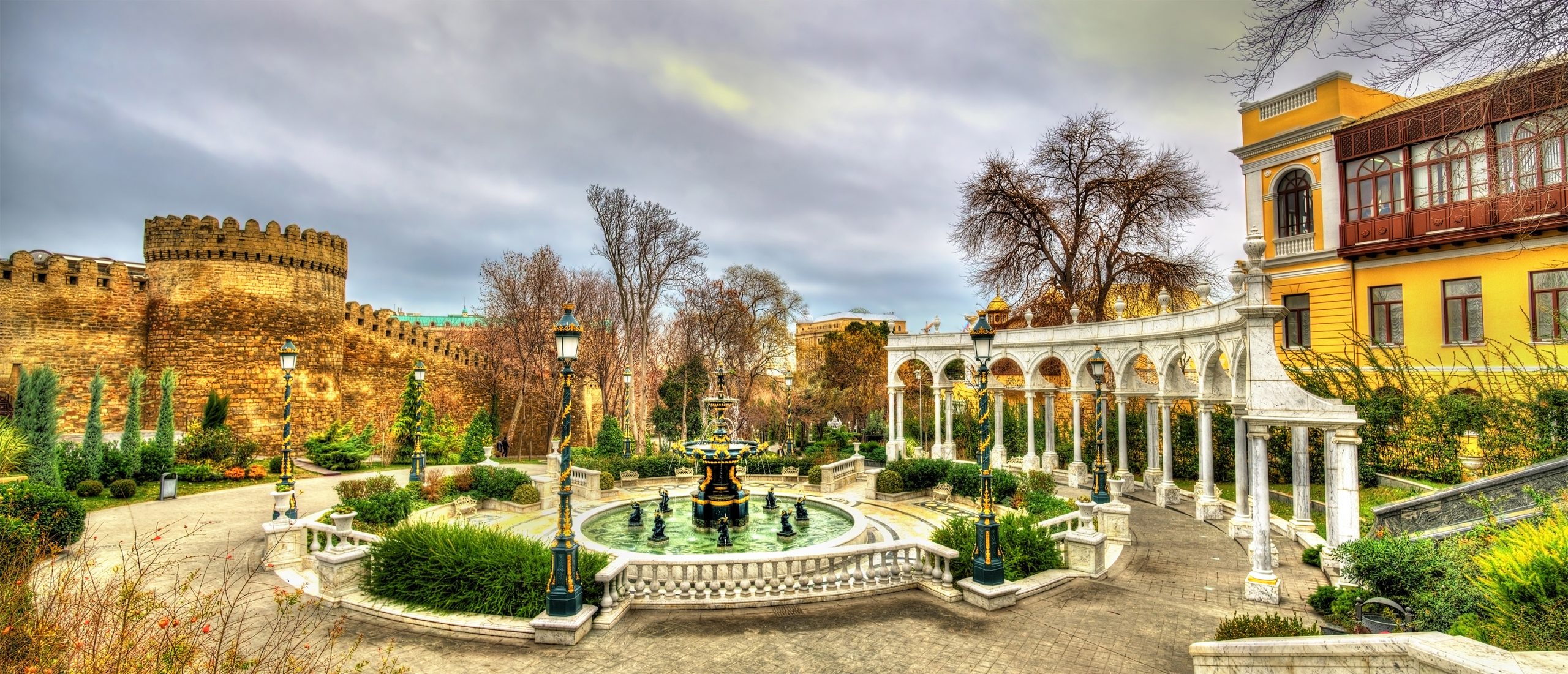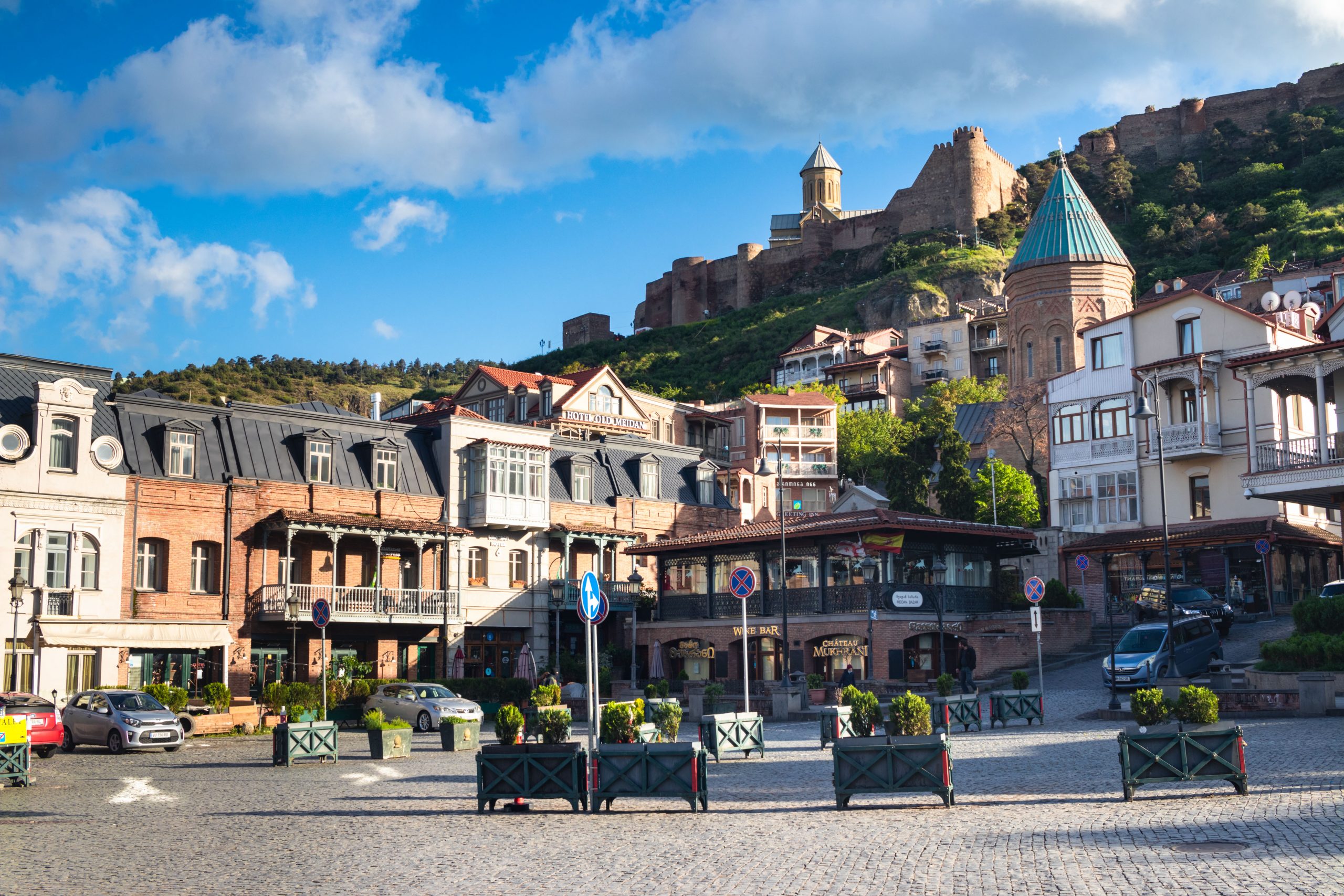Strategic Analysis Caucasus Brief
Bi-weekly review (12. 03. – 26. 3 2023)
Tomáš Baranec
Armenia

Republic Square, Yerevan. Photo: Andrei Bortnikau/ Shutterstock.com
Ararat Mirzoyan meets Sergey Lavrov in Moscow
On March 20, Ararat Mirzoyan, the Minister of Foreign Affairs of Armenia, met with Sergey Lavrov, the Minister of Foreign Affairs of Russia, in Moscow. The meeting started with tête-à-tête, then continued in an expanded format with the participation of two delegations.
Lavrov said the agenda of the meeting was full, and the whole range of bilateral relations was discussed, including joint cooperation within the framework of the CSTO military bloc, the EAEU economic union, the CIS, the UN and the OSCE. “We discussed regional and international issues and outlined the paths for our further strategic partnership and alliance,” Lavrov said. Mirzoyan said the meeting was held in a “confidential atmosphere”. He reiterated the importance of “issues related to security” in the South Caucasus.
On existing problems between Armenia and Azerbaijan, Lavrov stressed that the tripartite statements continue to be “the key to resolving” the situation in the region. According to him, they are the basis for the implementation of all decisions in the interests of ensuring the stabilization of the situation – in the military-political, international and legal spheres: “The Russian Federation is ready to assist in every possible way in resolving the existing problems between Armenia and Azerbaijan, both in unblocking transport routes and in concluding a peace treaty.”
Regarding the issues of security and rights of the Armenians of Nagorno-Karabakh, Lavrov said that he agrees with the position of the Prime Minister of Armenia – they should be resolved between the representatives of Nagorno-Karabakh and Azerbaijan: “Of course, we need to understand how high-quality these agreements will be. If you want to know my opinion, there are recent examples of history. The same was discussed in the Minsk Agreements about what rights the inhabitants of the eastern part of Ukraine should have. The right to their native language, the right to teach children in this language, to live and work using this language, to preserve their culture and religion, to have the opportunity for local self-government and to have some special ties with their compatriots. In the case of Donbas, it was Russia.”
Lavrov also accused the West of trying to end Russia’s close relationship with Armenia. “We see undisguised attempts by Western countries to estrange Armenia from Russia … undermine the regional security architecture while thinking and caring not about the interests of the countries located here but about their own vested geopolitical interests,” he told reporters after their talks in Moscow.
He also renewed Russian allegations that the Western powers are seeking to hijack Armenian-Azerbaijani agreements brokered by Moscow during and after the 2020 war in Nagorno-Karabakh.
Sources:
- Caucasus Watch, “Ararat Mirzoyan Meets Sergey Lavrov in Moscow“, https://caucasuswatch.de/en/news/ararat-mirzoyan-meets-sergey-lavrov-in-moscow.html
- JAM News, “Mirzoyan-Lavrov meeting in Moscow“, https://jam-news.net/meeting-of-lavrov-and-mirzoya-in-moscow/
- Azatutyun.am, „West Accused Of Trying To Drive Wedge Between Russia, Armenia“, https://www.azatutyun.am/a/32326592.html
Armenia begins the process of extending the nuclear plant 2nd power unit operation for another 10 years
At its meeting on March 23, the Armenian government decided to start a process to extend the operation period of the 2nd power unit of the Armenian Nuclear Power Plant (ANPP), informed News.am.
In the explanation of this decision, it is noted that the planned period of the operation of the 2nd power unit of the ANPP ended in 2016. Still, a program to extend the operation period of this power unit was implemented, resulting in its operation being extended until 2026.
According to the Caucasus Watch, it was specified that the work was financed by Russian credit and grant funds for 189 million USD and the state budget of Armenia for 162 million USD. The government decision envisaged developing an appropriate program, assessing the technical possibilities of extending the life of the ANPP for another ten years, the necessary financial resources, and the impact of possible investments on the electricity tariff for the end consumer.
Notably, the ANPP is the only nuclear power plant in the South Caucasus region, located near the city of Metsamor, about 30 km west of Yerevan. It was commissioned in 1980. The station has two nuclear power units with VVER-440-type reactors. Currently, only the second unit of the ANPP is operating, providing up to 35% of the annual electricity generation in the republic in recent years.
Sources:
- News.am, “Armenia begins the process of extending nuclear plant 2nd power unit operation for another 10 years“, https://news.am/eng/news/751119.html
- Caucasus Watch, “Armenia to Extend Life of its Nuclear Power Plant until 2036“, https://caucasuswatch.de/en/news/armenia-to-extend-life-of-its-nuclear-power-plant-until-2036.html

Gates of Syunik, Armenia. Photo: Shutterstock.com
Azerbaijani armed forces push forward in Nagorno-Karabakh
On the evening of March 25, the Azerbaijani army had advanced in de facto Nagorno-Karabakh. Azerbaijan’s Defense Ministry announced that its units had taken “necessary local control measures” to cut off a rough dirt road that passed slightly to the north of the main road connecting Karabakh to Armenia, known as the Lachin Corridor. The de facto local authorities confirmed the move in Karabakh and the Russian peacekeeping mission, which is supposed to provide security for the corridor.
The Russian Ministry of Defense called Azerbaijan to retreat to its original position. It stated in its press release that it was in negotiation with the Azerbaijani side on the matter. A statement from Russia’s Defense Ministry said that Azerbaijani units had “crossed the line of contact in the Shusha region, occupying a height marked at 2,054 meters altitude 2.9 kilometres northeast of Saribaba mountain and started engineering work on a post” there.
Baku, in turn, accused Russia of not preventing the transfer of Armenian military and arms to Karabakh. According to Azerbaijan’s position, the Lachin corridor, which connects Armenia and Karabakh and belongs to Azerbaijan according to international law, should have a border crossing point for both countries. The Armenian side, however, rejected this proposal, insisting on the exterritorial status of the Lachin corridor.
Later, the de facto authorities reported that Russian peacekeepers had “positioned themselves” at the same height the Azerbaijani forces had taken. They said the Russians were “controlling” the height and “negotiating with the Azerbaijani side to ensure their retreat.” There was no confirmation of that from either the Russian or Azerbaijani side.
The main Lachin road has been partly blocked for more than three months now due to the government-supported protests of Azerbaijani civil “activists”. Only the vehicles of the Russian Peacekeeping Contingent and the International Red Cross Committee are allowed to pass through. As a result, the de facto authorities of Nagorno-Karabakh have been using detour dirt roads.
As Eurasianet stressed, the traffic between Armenia and de facto Nagorno-Karabakh continues in a limited scope despite Azerbaijanis’ blockade. According to a report in the Russian newspaper Novaya Gazeta, the Russian peacekeepers have been running what appears to be a large-scale blockade-busting operation. According to the newspaper, Russian peacekeepers stationed in the Armenian city of Goris, near the start of the Lachin Corridor, can arrange passage to civilians through the blockade for prices up to $1,000 a person.
Food is also getting through, thanks to the Russian peacekeepers. The Novaya Gazeta report cited several sources matter-of-factly speaking about the scheme. “Food is being delivered, more or less,” one resident told the newspaper. “It’s just that the prices have skyrocketed because it’s very expensive to deliver stuff here. They have to pay several thousand dollars for every vehicle. Then suddenly, something new arrives in the shops, and we find out that the Russian peacekeepers are responsible for the delivery. They’re allowed to cross over. The “ecologists” let them through. So [the Russian peacekeepers] deliver food here in their cars. You know, those white trucks. Humanitarian aid? They probably do give out something for free as humanitarian aid, but most of it goes to the shops. Ask any vendor why it’s so expensive, and all of them will explain — because the peacekeepers ask for several thousand dollars for every vehicle.
Sources:
- KUCERA Joshua, Eurasianet.org, „Azerbaijani armed forces advance to close off Armenia-Karabakh road“, https://eurasianet.org/azerbaijani-armed-forces-advance-to-close-off-armenia-karabakh-road
- Caucasus Watch, “Azerbaijani Armed Forces Push Forward in Nagorno-Karabakh“, https://caucasuswatch.de/en/news/azerbaijani-armed-forces-push-forward-in-nagorno-karabakh.html
Police crackdown on water protest in Azerbaijan
About 200 villagers in Saatli District in central Azerbaijan staged a protest on March 13 over a long-festering problem: water shortage in the nearby Kura and Aras rivers. Protesters were violently suppressed by police firing tear gas and rubber bullets into the crowd, writes Eurasianet.org.
According to the residents, who stated that they had problems with drinking and irrigation water, they repeatedly complained to the relevant state institutions. However, their complaints were ignored. “We knocked on every door…We buy water from water carriers. Do you know what that means when unemployment is rampant and livelihoods are hard to come by? The purchased water is enough for ten days, and then, if you save. This is 20 AZN. We pay at least 60 AZN per month for drinking water…” Rashad Guliyev, a resident of the village, told Meydan TV.
The water shortage in the Kura (Mtkvari) and Aras (Araz, Araxes) river basins has acutely affected several central Azerbaijani districts for several years.
Saatli residents told BBC Azerbaijani that they have to water their fields with brackish water. “These soils will become dead in a maximum of two years,” one resident said. “They won’t yield even 10 centimetres.”
The presence of salt in the local river water is a consequence of mismanagement, according to a report on Azerbaijani state TV in June 2020. Overuse, chiefly for irrigation, has so reduced the Kura’s level that it no longer flows into the Caspian Sea. Instead, it said the salty seawater flows back into the river bed. In July 2020, President Ilham Aliyev addressed the issue at a government meeting where he said that drought, wasteful agricultural practices, and in some cases, the “indifferent attitude of relevant bodies” had contributed to the country’s water problems. “From now on, drinking water and irrigation projects will be on our agenda as the most important issues,” he pledged at the meeting. But the problem has gone unaddressed, according to local activists.
Agriculture expert Vahid Maharramli told foreign-based independent Meydan TV about his recent visit to Saatli. “The lack of water was causing serious damage to farms, cotton fields, and crops. But right there was a huge canal, full of water, going to the farm of an oligarch,” he said. “The villagers told me that the police would come to the area whenever they so much as stood near the water. The amount of water in that canal would be enough to solve the water problem not in one region but in several regions. There are many such examples, almost in every district. Oligarchs privatize water channels and fish in the lakes [created by them].”
Three participants in protest action in the Saatli region were arrested administratively. According to local residents, three people were injured.
Sources:
- ISAYEV Heydar, Eurasianet.org, “Police crack down on water protest in Azerbaijan“, https://eurasianet.org/police-crack-down-on-water-protest-in-azerbaijan
- Meydan TV, “Police violently repress Saatli residents who were protesting water supply cuts“, https://www.meydan.tv/en/article/police-violently-repress-saatli-residents-who-were-protesting-water-supply-cuts/
- Turan.az, “Three participants of the protest action in Saatli arrested“, https://www.turan.az/ext/news/2023/3/free/Social/en/2572.htm
New Abkhaz de facto leadership suggests détente with Tbilisi and passports for Georgians from the Gali district
Two high ranking officials of the new Abkhaz de facto government – the head of the region’s security council, Sergei Shamba and its de facto prime minister Alexander Ankvab – have recently suggested the development of trade relations and dialogue with Tbilisi. These statements, coupled with support for passportisation of ethnic Georgians living in the Gali district controlled by Abkhazian de facto authorities were met with harsh criticism from local opposition groups.
Sergei Shamba gave a lengthy interview to RFE/RL’s Russian-language Ekho Kavkaza on August 8 in which he claimed that the armed conflict with Tbilisi „is over“ and therefore, Sukhumi should think, how to build „friendly relations“ with Tbilisi. Former Abkhazian prime minister and minister of foreign affairs specifically spoke of „legalising“ trade and preventing smuggling across the Enguri River, which divides this separatist region from Georgia proper. Shamba admitted that agreement with Georgia on trade is not realistic at the moment, as Tbilisi rejects sealing any deal with representatives of Sukhumi, but he added that the latter could still introduce customs control on such goods.
Regarding the sensitive issue of Abkhaz citizenship for ethnic Georgians living in Abkhazia’s easternmost district of Gali, Shamba stressed, that these people should not be alienated, especially „as they are mostly indigenous inhabitants of Abkhazia.“ Denying Abkhaz „passports‘ to Gali Georgians on the grounds of their holding of Georgian citizenship is „wrong“, taking into account the fact that Abkhaz enjoy having Russian passports even though Sokhumi and Moscow have not yet signed an agreement on dual citizenship, added the new head of the region’s security council.
In a similar sense continued Alexander Ankvab, Abkhazia’s de facto head of the government, in his interview with local media outlet Apsnypress on August 13.
Ankvab noted that it is „unfair „to deprive Gali Georgians their Abkhaz passports. On the other hand, de facto prime minister slammed a recent statement by Georgian Reconciliation Minister Paata Zakareishvili, who claimed that the new Abkhaz leadership is „less pro-Russian“ than the previous one. Ankvab called it „ridiculous.“ „There were no such leaders in the Abkhaz political space, and there are none. This fully applies to president Bzhania, Ankvab, Shamba, and Khajimba,“ he underscored.
These comments were however met with harsh criticism from local opposition groups. In its statement from August 17, „Aruaa“, an influential union of Abkhaz war veterans, said that Ankvabs statements regarding passportisation of the Gali district have bred resentment „among all patriotic forces of the country.“ Organisation also claimed that the de facto prime minister is neglecting the rights of other nationalities residing in Abkhazia while advocating exclusively for the rights of Georgian nationals. Aruaa reminded Ankvab that similar policies of „illegal“ issuance of Abkhaz „passports“ to Georgian citizens had led to his ousting from the office back in 2014, and threatened with protests.
Abkhaz political party „Apsny“ in its statement expressed concerns over Abkhaz leadership’s consideration of cooperation with Georgia, which due to the statement remains „in a state of war with us (Abkhaz)“.
In 2014, the Abkhaz Parliament annulled the previously-issued Abkhaz passports of the 27,000 inhabitants of Gali District, due to the dual-citizenship of its inhabitants (most of whom are ethnic Georgians) with Georgia, which is illegal under the laws of Abkhazia.
Sources:
- Civil.ge, Abkhaz Security Council Head Talks Gali Passportization, Dialogue, Trade with Tbilisi, https://civil.ge/archives/362113
- Ekho Kavkaza, Сергей Шамба: «Все время жить во вражде невозможно» (Sergey Shamba: „It’s impossible to live in enmity all the time“), https://www.ekhokavkaza.com/a/30772165.html
- Civil.ge, Abkhazia’s Ankvab: „Gali Georgians Are Our Citizens“, https://civil.ge/archives/362610
- JAMnews, Abkhaz opposition threatens protests if citizenship is restored to resident Georgians, https://jam-news.net/abkhazia-ankvab-georgians-citizenship/
- Civil.ge, Abkhaz Opposition Speaks against Detente with Tbilisi, Gali Passportization, https://civil.ge/archives/362800
For additional information see:
- Eurasianet.org, Abkhazia Loses a Leader, But Keeps Its Problems, https://eurasianet.org/abkhazia-loses-a-leader-but-keeps-its-problems
- Civil.ge, Abkhazia’s Shamba Reiterates Calls for Dialogue with Tbilisi, https://civil.ge/archives/363138
Four members of the Ruling party stepped down
On March 24, the Georgian Parliament stripped majority MPs Vladimir Chachibaia, Nino Iobashvili, Giorgi Khelashvili, and Irakli Kovzanadze of their mandates at their request. The four were amongst the few ruling party lawmakers not to vote in favour of the controversial foreign agent bill on its first reading in Parliament earlier in March.
The MPs have not spoken out strongly against the bill, with at least three of them accepting jobs as government advisors. Georgian Dream chair Irakli Kobakhidze said their departures were due to “liberal fascist bullying”.
Former Lieutenant General of the Georgian Armed Forces and a member of the ruling Georgian Dream party Chachibaia was one of the few not to support the withdrawn law on “foreign agents” and intends to end his work in Parliament. In an interview with the Formula TV program Droeba, Chachibaya said that this was his “persistent desire.”
“I think I was not ready for parliamentary life. You know, I served in the army for 30 years. My personal desire is to leave Parliament. But at the same time, I remain a loyal party member. I think that I have realized myself in the state or any other service better than as a member of Parliament. I think my decision does not give me the right to remain in Parliament; I mean that I did not vote for the bill [on foreign agents],” Chachibaia said.
Four deputies from the ruling party did not participate in the voting on the so-called “Russian bill”: Ketevan Dumbadze, Vladimir Chachibaia, Irakli Medzmariashvili and David Sergeenko. Dumbadze and Medzmariashvili, who as well did not participate in the voting, later explained that there had been a technical error and that they actually supported the bill. Sergeenko stated that he did not go into the bill’s details.
At the same time, the majority in society, the United States and the European Union reacted sharply negatively to the law “on foreign agents”.
Sources:
- KINCHA Shota, OC Media, “Georgian Dream MPs who did not vote for foreign agent bill ‘resign’“, https://oc-media.org/georgian-dream-mps-who-did-not-vote-for-foreign-agent-bill-resign/
- Caucasus Watch, „MPs Resign from Georgian Parliament“, https://caucasuswatch.de/en/news/mps-resign-from-georgian-parliament.html
- JAM News, „Georgian general and member of ruling party does not want to take part in parliament“, https://jam-news.net/general-chachibaia-and-parliament/
- Newposts.ge, „Irakli Kovzanadze leaves Parliament“, https://www.newposts.ge/en/news/politics/irakli-kovzanadze-leaves-parliament

Tbilisi, Georgia. Photo: Shutterstock.com
German FM Annalena Baerbock visits Georgia
On March 23-24, German Foreign Minister Annalena Baerbock visited Georgia, where she met with her counterpart Ilia Darchiashvili, Georgian President Salome Zurabishvili and PM Gharibashvili.
According to Eurasianet.org, the visit came as worries grow both in Brussels and Tbilisi that the Georgian government may not be entirely serious about pursuing its declared goal of EU membership candidacy, particularly in the wake of the ruling party’s attempts to push through controversial “foreign agent” bills. “During my trip, I want to make it clear that Germany is fully committed to Georgia’s prospect of EU membership,” Baerbock said prior to her arrival. “We see the attempts to divert the country from the pro-European course that the overwhelming majority of Georgians want.”
Baerbock started her visit to Georgia by meeting with the civil society representatives, followed by a meeting with her Georgian counterpart FM Darchiashvili. At the press conference following the meeting, Georgian FM stressed that Baerbock’s visit demonstrates Germany’s particular interest in Georgia, as well as Germany’s firm support at this important time and against the background of regional security challenges. He also expressed gratitude for Germany’s support for Georgia’s EU integration, adding that the sides discussed the “historical importance of EU candidacy for Georgia” and “the steps taken by the Georgian government to fulfil 12 EU priorities.” He expressed the hope that “the progress will be properly assessed” and result in a historic decision. According to Darchiashvili, the sides discussed EU and NATO integration and regional security, including the situation in the occupied territories.
In her remarks to the press, Baerbock stressed the importance of meeting the 12 EU priorities for EU candidate status, with particular emphasis on issues such as the rule of law, freedom of speech, strong civil society and de-polarization.
President Zurabishvili discussed with the German Foreign Minister issues related to the European integration process of Georgia. As the President stated at the meeting held in the Orbeliani Palace, “the Georgian people will not understand a second rejection of the EU candidate status and will feel abandoned by Europe in such a difficult situation”. The President emphasized the importance of the visit of the Foreign Minister of Georgia’s partner country to express Germany’s continued support for Georgia’s independence and European integration.
For her part, Baerbock said she was in Tbilisi because she wanted to see Georgia and its people in the European Union. “That is why I am here, and that is what my government supports. “Georgia must continue its reforms to obtain candidate status,” said Baerbock.
The Head of the EU Monitoring Mission in Georgia, Dimitrios Karabalis, hosted Baerbock at the occupation Line in the Odzisi area. They discussed ongoing “borderisation” activities and their negative impact on the local population’s freedom of movement. The Foreign Minister expressed her gratitude for EUMM’s contribution to stability in Georgia and the wider region. Germany has the largest representation in the EUMM, with 28 nationals serving in the Mission.
“After the European Commission’s report comes out this fall, it will be up to all 27 EU member states to decide on Georgia’s candidacy, and the support of the bloc’s most populous and economically powerful country will be vital. But Tbilisi’s messages remain mixed: on the one hand, Georgian Foreign Minister Darchiashvili duly holds meetings with EU leaders to discuss progress on reforms while the Parliament works on relevant legislation. And on the other hand, Tbilisi pushes controversial laws and engages in confrontational rhetoric toward the West, which many saw as one of the main reasons behind the initial failure to get candidate status last year”, comments Eurasianet.org.
Source:
- GABRITCHIDZE Nini, Eurasianet.org, „Germany’s Baerbock arrives in Tbilisi amid EU uncertainty“, https://eurasianet.org/germanys-baerbock-arrives-in-tbilisi-amid-eu-uncertainty
- Agenda.ge, „German FM Annalena Baerbock Visits Georgia“, https://civil.ge/archives/533309
Extremists burned the EU flag from the Georgian Parliament
At the rally organized by the ultra-right and ultra-conservative party “Conservative Movement” on March 14, a group of protesters removed and burned the EU flag near the parliament building. Several hundred supporters of the “Conservative Movement” gathered at Saakadze Square on March 14 at 12:00 pm and marched towards the Parliament. They made demands and then took down, tore, and burned the European Union flag that was erected in front of the parliamentary building. Media footage reveals that the Police present at the scene did not intervene.
During their address to the legislature, the leaders of the conservative party delivered a series of anti-Western statements while also issuing several demands to the government. These included the release of those arrested for homophobic violence against journalists on July 5-6, 2021, the imposition of “exemplary punishment” upon the organizers of the “coup d’état” that took place during protests against the bills on “foreign agents” on March 7-9 and the holding of a referendum on the law concerning “foreign agents” and “foreign slaves”.
Shota Martynenko, one of the leaders of the “Conservative Movement”, proclaimed, “It is not the people but rather the government itself that should execute the law. Otherwise, the law will be executed by the people.” The “conservative movement” action was preceded by the rallies against the draft laws on “foreign agents”. As a result, the ruling majority was forced to withdraw its own draft laws.
During the initiation of the law on “foreign agents”, and especially after its withdrawal, the ruling party’s rhetoric came close to that of the “conservative movement” against liberal organizations. Georgian PM Irakli Garibashvili and GD chair Irakli Kobakhidze made statements against “destructive”, “anarchist”, “extremist”, and “liberal-fascist” forces in the country. They also claimed that the forces associated with the opposition were “anti-church” and “anti-Georgian.”
The Georgian Interior Ministry on Tuesday said it had launched administrative proceedings in the case. Since January 2022, burning the symbols of the European Union, NATO, and countries with diplomatic relations with Georgia qualifies as an administrative offence, which would set you back GEL 1,000-2,000 in fine or a jail term of up to 15 days in aggravating circumstances.
Source:
- Civil.ge, „Representatives of the ‘Conservative Movement’ Burn EU Flag in Front of Parliament“, https://civil.ge/archives/531546
- Agenda.ge, “Interior Ministry launches administrative proceedings after far-right activists burn Parliament building’s EU flag [VIDEO]“, https://agenda.ge/en/news/2023/1044

Icheri, Azerbaijan. Photo: Shutterstock.com



Contact us